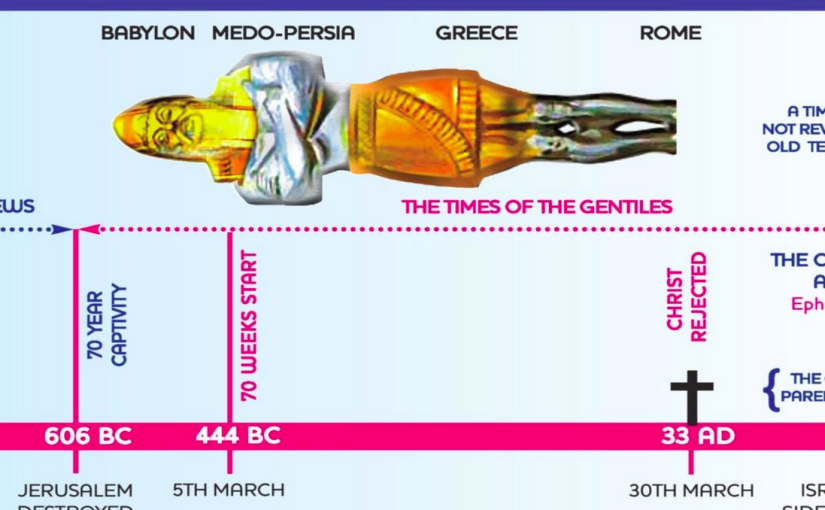If you listen to Bible prophecy teachers, you will hear reasons why it is important to teach prophecy. We are encouraged in the Bible to preach and teach “all the counsel of God” (Acts 20:27). Most preachers do not teach prophecy at all, other than the annual Christmas message that may include Isaiah 7:14 or Micah 5:2.
It has been claimed that the Bible contains anywhere from ¼ to 1/3 prophecy. Pete Garcia says the Bible is 1/3 prophecy. Some in the Calvary Chapel movement claim it is more than 1/3 prophecy. Bill Koenig claims the Bible is 26% prophecy. Jack Hibbs claims the Bible is somewhere between 27 and 31% prophecy. Tim LaHaye calculated the percentage of prophecy in each book of the Bible, and it summed to approximately 28% (Also see page 14 of this document by Dr. Ed Knorr).
These numbers are surprising to the average Christian who hasn’t read the Bible for themselves, because prophecy is preached on so rarely.
Fulfilled prophecy is one of the most indisputable proofs of God’s authorship of the Bible. More people would believe, and believers’ faith would be strengthened, if they understood the Bible’s perfect track record on fulfilled prophecy. Who other than God, who sits outside of space-time, can know the future with 100% accuracy?
Dr. John Walvoord says that most prophecies have been fulfilled. But scholars say that there are 321 prophecies in the Bible that are yet to be fulfilled concerning Christ’s return. How can we know if any of these prophecies are about to be fulfilled if we do not study them?
But what is the truth about the amount of prophecy in the Bible? Whose numbers should we believe? And how do you count whether a portion of the Bible is prophecy or not? And what is prophecy anyway? This post begins a series of posts that will answer these questions.
How much of the Bible is prophecy? The easiest way to count it would be to count by books. Some books of the Bible are prophetic, and some are not. In the Old Testament, the Major and Minor Prophets are generally considered to be the prophetic books. This makes 16 books. One book of the new Testament is prophecy- Revelation. This makes a total of 17 books. Considering that the Bible contains 66 books, we find that the Bible is 25.8% prophecy. This must be where Bill Koenig gets his 26% number from.
What if we looked at it by counting chapters? Just considering the 17 prophetic books, the total number of chapters is 263 (not counting four historical narrative chapters in the middle of Isaiah). Since the Bible contains 1189 chapters, the percentage of Bible prophecy by chapter is 22.2%. But this ignores many parts of the Bible that also contain prophecy. Many of the psalms are prophetic. Moses was a prophet. And Elijah, Elisha, and many other prophets were written of in Kings and Chronicles.
If we were to count by chapter, what percentage of the chapter would have to be prophetic to count the chapter as prophetic? 50%? 51%? More than that? If we followed this method, we would get a more accurate answer than the two previous calculations, but it still would not be an exact answer.
To get an exact answer, we have to count verses. According to Blue Letter Bible, there are 31,102 verses in the Bible. How many of them mention a prophecy? I spent six months counting verses in order to get an exact answer.
What is a Prophecy?
Before we get into the details of the counting process, let’s define what is meant by a prophecy. A prophecy is a statement made in the Bible that predicts a future event, or makes reference to a past prediction. A future event is defined at the time of the original writing of the Bible text. So that means all prophecies that have been fulfilled still count as a prophecy. Most prophetic statements have been fulfilled, but there are still many prophecies about the second coming of Christ that have not yet been fulfilled.
By using this definition of a prophecy, all Biblical historical events that fulfill a previous prophecy are counted as prophecy. And all statements that make reference to a previous prophecy are counted as prophecy.
Don Stewart has an excellent article on Bible Prophecy here.
What is Not Prophecy?
Prophecies have to be specific. General statements about the future do not count as prophecy. For example, Psalm 10:16 says, “ The LORD is King for ever and ever: the heathen are perished out of his land”. This verse makes a statement that God will sit on his throne for ever and ever. This statement refers to the future but does not count as a prophecy because it is not specific enough. One could argue that this verse is prophetic because it speaks of the heathen being perished out of God’s land. But there has never been a time in history where all of the heathen have perished out of the Promised Land. So therefore this must speak of a future time. The process of determining whether or not a verse is prophecy is not exact; some assumptions have been made to simplify the process. These will be discussed further in future posts. But counting verses will still bring us to a more accurate result than trying to count chapters or books.
One goal of this study is to encourage preachers and teachers to teach more prophecy. 2 Timothy 3:16 says “all scripture” is profitable for teaching. If we are ignoring ¼ to 1/3 of scripture, are we really obeying God?
The next post will take a look at some of the prophecies in the book of Genesis.
